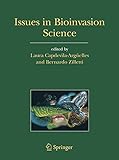Issues in Bioinvasion Science : EEI 2003: a Contribution to the Knowledge on Invasive Alien Species / by Laura Capdevila-Argüelles, Bernardo Zilletti.
Tipo de material: TextoEditor: Dordrecht : Springer Netherlands, 2005Descripción: vI, 147 páginas recurso en líneaTipo de contenido:
TextoEditor: Dordrecht : Springer Netherlands, 2005Descripción: vI, 147 páginas recurso en líneaTipo de contenido: - texto
- computadora
- recurso en línea
- 9781402038709
- QH75-77
Springer eBooks
Invasion biology of Australian ectomycorrhizal fungi introduced with eucalypt plantations into the Iberian Peninsula -- Phenological and demographic behaviour of an exotic invasive weed in agroecosystems -- Short-term responses to salinity of an invasive cordgrass -- The American brine shrimp as an exotic invasive species in the western Mediterranean -- Impact of an introduced Crustacean on the trophic webs of Mediterranean wetlands -- Loss of diversity and degradation of wetlands as a result of introducing exotic crayfish -- Worldwide invasion of vector mosquitoes: present European distribution and challenges for Spain -- Holocene turnover of the French vertebrate fauna -- Life-history traits of invasive fish in small Mediterranean streams -- Genetic introgression on freshwater fish populations caused by restocking programmes -- Eradications of invasive alien species in Europe: a review -- French attempts to eradicate non-indigenous mammals and their consequences for native biota -- Successful eradication of invasive rodents from a small island through pulsed baiting inside covered stations.
Biological invasions are a global problem whose local impact can be of great magnitude. The prevention and minimization of the impact of invasive alien species has become a priority because of their negative impact on biodiversity, economy and public health. Effective responses are needed; cooperation and coordination among countries and/or different sectors of society are a must. To combine and share experiences on biological invasions at international, regional and local level it is essential to develop compatible approaches to common problems. With this aim, the GEI (Grupo Especies Invasoras) organised the First National Conference on Invasive Alien Species in Spain in 2003. Scientists coming from different parts of the Iberian Peninsula belonging to universities, public administration, NGOs and environmental enterprises and world-renowned experts on biological invasions from other countries responded to this "call for action" and participated in the conference. Issues in Bioinvasion Science contains key contributions of this conference. The themes included cut across different aspects of non-native species invasions. This volume is essential reading for anyone seeking an understanding of non-native species invasions. Our aim: to go beyond national boundaries in order to tackle these complex biological issues.
Para consulta fuera de la UANL se requiere clave de acceso remoto.


